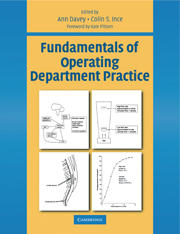Book contents
- Frontmatter
- Contents
- Contributors
- Preface
- Foreword
- Acknowledgements
- Introduction
- Chapter 1 The operating department practitioner, the patient and the law
- Chapter 2 Aspects of health and safety in the operating department
- Chapter 3 The caring practitioner
- Chapter 4 Strategies for infection control in the operating department
- Chapter 5 Sterilization, decontamination and the surgical field
- Chapter 6 The fundamentals of cardiovascular physiology
- Chapter 7 Fundamentals of respiratory physiology
- Chapter 8 Scientific principles in relation to the anaesthetic machine
- Chapter 9 Fundamentals of artificial ventilation of the lung
- Chapter 10 Scientific principles in relation to monitoring equipment
- Chapter 11 Scientific principles in relation to endoscopic, laser and radiological equipment
- Chapter 12 Pharmacological principles of drug administration
- Chapter 13 The pharmacology of drugs used in general anaesthesia
- Chapter 14 The local anaesthetic drugs - does the ideal agent exist?
- Chapter 15 The safe positioning of patients for surgery
- Chapter 16 Principles involved in the management and use of equipment
- Chapter 17 Understanding suture materials
- Chapter 18 Fundamentals ofpaediatric surgery and anaesthesia
- Chapter 19 Fundamentals of hyperthermia and hypothermia
- Chapter 20 Fundamentals of fluid and electrolyte balance during surgery
- Chapter 21 The physiology of blood and its administration
- Chapter 22 Fundamentals of pain relief
- Chapter 23 Fundamentals of dressings and drains in relation to wound healing
- Chapter 24 The recovery of patients from anaesthesia and surgery
- Chapter 25 Fundamentals of emergency and obstetric anaesthesia
- Chapter 26 Identification and management of anaesthetic emergencies
- Chapter 27 The fundamentals of emergency resuscitation
- Appendixes
- Index
Chapter 1 - The operating department practitioner, the patient and the law
Published online by Cambridge University Press: 05 October 2015
- Frontmatter
- Contents
- Contributors
- Preface
- Foreword
- Acknowledgements
- Introduction
- Chapter 1 The operating department practitioner, the patient and the law
- Chapter 2 Aspects of health and safety in the operating department
- Chapter 3 The caring practitioner
- Chapter 4 Strategies for infection control in the operating department
- Chapter 5 Sterilization, decontamination and the surgical field
- Chapter 6 The fundamentals of cardiovascular physiology
- Chapter 7 Fundamentals of respiratory physiology
- Chapter 8 Scientific principles in relation to the anaesthetic machine
- Chapter 9 Fundamentals of artificial ventilation of the lung
- Chapter 10 Scientific principles in relation to monitoring equipment
- Chapter 11 Scientific principles in relation to endoscopic, laser and radiological equipment
- Chapter 12 Pharmacological principles of drug administration
- Chapter 13 The pharmacology of drugs used in general anaesthesia
- Chapter 14 The local anaesthetic drugs - does the ideal agent exist?
- Chapter 15 The safe positioning of patients for surgery
- Chapter 16 Principles involved in the management and use of equipment
- Chapter 17 Understanding suture materials
- Chapter 18 Fundamentals ofpaediatric surgery and anaesthesia
- Chapter 19 Fundamentals of hyperthermia and hypothermia
- Chapter 20 Fundamentals of fluid and electrolyte balance during surgery
- Chapter 21 The physiology of blood and its administration
- Chapter 22 Fundamentals of pain relief
- Chapter 23 Fundamentals of dressings and drains in relation to wound healing
- Chapter 24 The recovery of patients from anaesthesia and surgery
- Chapter 25 Fundamentals of emergency and obstetric anaesthesia
- Chapter 26 Identification and management of anaesthetic emergencies
- Chapter 27 The fundamentals of emergency resuscitation
- Appendixes
- Index
Summary
INTRODUCTION
Each patient passing through an operating department has a right to be dealt with in a sympathetic and professional manner. This care extends throughout the peri-operative period, a term that describes the time around and including surgery and anaesthesia. Theatre professionals are becoming involved at all stages of this process and in some hospitals only operating department staff look after the day-case patients. Management of this care is discussed in Chapter 3 and many individuals are involved in what may be a lengthy process.
It is, however, important that care meets the highest moral, ethical and legal standards that have been introduced to protect not only the patient and the patient's rights but also those of the theatre worker. This chapter seeks to clarify some of this legislation but also tries to explain why it was introduced in the first place. Some of these topics are dealt with in greater detail elsewhere in the book and will only be mentioned in passing. It is important for the reader to understand that this section deals with English Law and must only be interpreted in this context.
THE LAW AND ETHICS
A principle may be defined as a theoretical base which can and must apply to all people in order to maintain a stable society. There are four main principles guiding the actions of the health-care worker:
1. Autonomy - the right to self-determination.
2. Beneficence - to act in a way to do good.
3. Non-maleficence - to act in a way to do no harm.
4. Justice - to be fair to all individuals.
Ignoring these principles may not necessarily be illegal because breaking the law and breaking an ethical code are not the same and it is for this reason that codes of practice have been introduced by the professional organizations. It is not illegal for a doctor to divulge confidential information about a patient, without that patient's consent, to a person not involved with their medical management but it does break the medical code of practice. If this action came to light the doctor would be disciplined and, depending on the seriousness of the complaint, may be suspended from practice.
- Type
- Chapter
- Information
- Fundamentals of Operating Department Practice , pp. 9 - 20Publisher: Cambridge University PressPrint publication year: 1999



